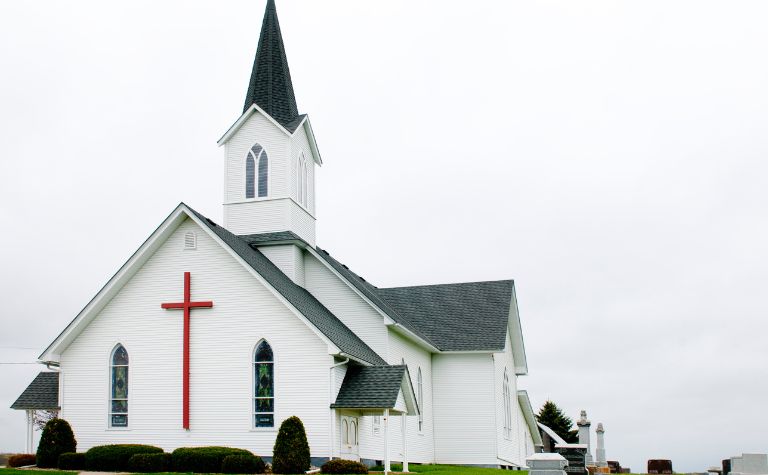Many people have heard the terms “Protestant” and “Pentecostal.” They know they are associated with Christianity but are not sure of the difference between them. Are they denominations? Churches? Theologies? Or are they something else altogether?
Protestantism is one of the three historical branches of the Christian faith, along with Roman Catholicism and Eastern Orthodoxy. Pentecostalism is a 20th-century movement within the Protestant tradition that believes speaking in tongues is the initial evidence of post-conversion baptism in the Holy Spirit.
What is the origin of Protestantism and Pentecostalism? What is the largest denomination in each tradition? Do Protestants and Pentecostals believe the same things about God, Christ, the Holy Spirit, and the end times? Keep reading to learn more.
Also, see Eastern Orthodox vs. Protestant vs. Catholic Comparison to learn more.

Protestants and Pentecostals: Similarities and Differences
The men and women who started the Pentecostal movement in America in the early 20th century belonged to Protestant churches and believed in Protestant doctrines. (Also, see Protestant vs. Eastern Orthodox: What’s the Difference?)
Their beliefs and practices did not directly challenge any key tenet of the Protestant tradition regarding the importance of grace, faith, and Jesus Christ.
Pentecostals did not seek to eliminate any core conviction of Protestants but desired to add a unique experience: speaking in tongues, which they believed was available to any believer after their conversion to Christ.
| Protestantism | Pentecostalism | |
|---|---|---|
| Origin | 16th-century Europe, especially Germany, under the reforms of Martin Luther (1483-1546). | The modern expression was born in early 20th-century America at the Azusa Street Revival in Los Angeles, California, in 1906. |
| Meaning of the name | The word “Protestant” comes from the Latin word protestari, meaning “to bear witness.” | “Pentecostal” refers to the first day of Pentecost (Acts 2) when the Holy Spirit came upon the early church in a unique way that enabled believers to speak in unknown languages. |
| Early influencer | Martin Luther, John Calvin of France (1509-1564), and Ulrich Zwingli of Switzerland (1484-1531) | Charles Parham (1873-1929) and William Seymour (1870-1922) significantly influenced the early stages of the tradition. |
| Significant writing outside the Bible | The Apostles Creed, the Nicene Creed; the writings and sermons of Martin Luther, especially the 95 Theses, Calvin’s The Institutes of the Christians Religion; many others | The Assemblies of God’s doctrinal statement called The 16 Fundamental Truths |
| What are the largest denominations in the tradition today? | Southern Baptist Convention, the United Methodist Church, the Evangelical Lutheran Church of America, and the Assemblies of God | Assemblies of God is by far the largest Pentecostal denomination. It is followed by the Church of God in Christ and the Church of God (Cleveland, Tennessee). |
| Theological and Social worldview | Protestants may be liberal or conservative theologically or socially. | Pentecostals are overwhelmingly conservative and evangelical. To date, there has not been a major liberal or progressive movement in the tradition’s largest denominations, such as the Assemblies of God. |
Also, see Protestant vs. Evangelical: What’s the Difference?

Protestant and Pentecostal Beliefs Compared
| Protestantism | Pentecostalism | |
|---|---|---|
| Scripture | One of the hallmarks of the Protestant tradition is the authority of Scripture over and above church tradition. Protestants historically believe in the inspiration and authority of Scripture. | Pentecostals hold to the inspiration, authority, inerrancy, and infallibility of the Bible. |
| God | Protestants believe in the Trinity, one God who exists in three persons. The Father, Son, and Holy Spirit are each fully divine. | Pentecostals believe in the Trinity and hold that each member is fully divine. So-called “Oneness Pentecostals” don’t believe in the Trinity and they don’t have fellowship with Trinitarian denominations like the Assemblies of God. |
| Christ | Jesus is the second person of the Trinity. He is God in human flesh. He is 100% God and 100% man. Jesus was born of a virgin, lived a sinless life, died as an atonement for sin, and was physically resurrection on the third day. | Jesus is the second person of the Trinity. He is God in human flesh. He is 100% God and 100% man. Jesus was born of a virgin, lived a sinless life, died as an atonement for sin, and was physically resurrection on the third day. |
| Salvation | Protestants believe that salvation is by grace through faith in Christ alone. Protestants can be Arminian, Calvinist, Baptist, or something else. | Jesus Christ is the only way to be saved. As Arminians, Pentecostals emphasize people’s free will in choosing faith and repentance. |
| Baptism | Generally, Protestants believe baptism identifies a person with the death and resurrection of Christ (Rom. 6:3-5) and obedience to Christ. It also signifies their inclusion into the church community (Acts 2:38-47). Protestants do not agree about who (children or adults) should be baptized and how (sprinkling or immersion). | Pentecostals hold to “believer’s baptism,” meaning that a person must be a professing Christian to be baptized. This rules out infants. Baptism is a declaration that a person has converted and is now a follower of Christ. |
| Communion | Generally, Protestants believe the Lord’s Supper is a continual practice that Christ started before his death and resurrection. Protestants don’t agree about the nature of the bread and cup. | Pentecostals believe the bread and cup are symbols that remind people of Christ’s death for sin and anticipate his return. |
| Holy Spirit | The Holy Spirit is the third person of the Trinity. He is fully divine. The Spirit applies the salvation that the Father planned and that the Son earned for sinners. He bestows spiritual gifts on believers that they are to use for the edification of the Church. | Pentecostals believe that Holy Spirit is divine, applies Christ’s salvation, and distributes spiritual gifts. Unlike Presbyterianism, it holds that believers should seek and expect a second work of baptism in the Holy Spirit, which is a normal experience for all Christians. |

| Protestantism | Pentecostalism | |
|---|---|---|
| Speaking in tongues | Some Protestants are Pentecostal, and some aren’t. Some Protestants in non-Pentecostal churches speak in tongues. | Pentecostals believe that all spiritual gifts, including speaking in tongues, are available to believers today. Speaking in tongues is witnessed by the initial physical sign of speaking with other tongues. |
| Sanctification | The majority of Protestants believe sanctification is a cooperative act between God and people. Very few Protestants believe that a person can complete their sanctification in this lifetime, but of those who do, many are Pentecostal. | Sanctification is the act of separating oneself from sin and of dedication to God. Some Pentecostals believe in “perfectionism,” which holds that believers can be separated from sin in this lifetime. |
| Church | A key tenet of Protestantism is that the Church is comprised of people who Christ has saved from sin. | Pentecostals have the same general belief about the Church as the wider Protestant tradition. |
| Divine Healing | Protestants believe that God can and does heal people. Not all Protestants believe that healing is provided for in the atonement of Christ. | Divine healing is a key tenet in Pentecostal theology. It is an integral part of the gospel. Deliverance from sickness is provided for in the atonement and is the privilege of all believers. |
| The Return of Christ | Protestants believe in the Second Coming of Christ, which is a core belief in the tradition. | Pentecostals believe in the Second Coming of Christ. |
| Millennium | Protestant churches may be Premillennial, Postmillennial, or Amillennial. | As premillennialists, Pentecostals believe that the 1,000-year reign of Christ is literal and will occur after the rapture and seven-year tribulation. |
| Judgment | Protestants generally agree that judgment after death is inevitable for all people. Some believe hell consists of eternal conscious torment. Others believe people in hell will cease to exist after a period of punishment. | A final judgment is inevitable. Those not found to be in Christ will go to hell for eternity. Those found in Christ will go to heaven for eternity. |
Also, see Do Catholics Believe Protestants Go to Heaven?
Please see the related articles below.
References:
[1] Source
[2] Source
[3] Source
Related Questions
Catholic vs. Protestant vs. Orthodox: What's the Difference?
Roman Catholicism, Protestant Christianity, and the Eastern Orthodox Church are the three historical branches of the Christian religion. Each tradition traces its doctrines and practices to the New...
Pentecostalism vs. Charismatic Movement: What's the Difference?
Many people know that the terms "Pentecostal" and "charismatic" are associated with certain beliefs, churches, and people in modern Christianity but aren't sure how they compare. Although the terms...
